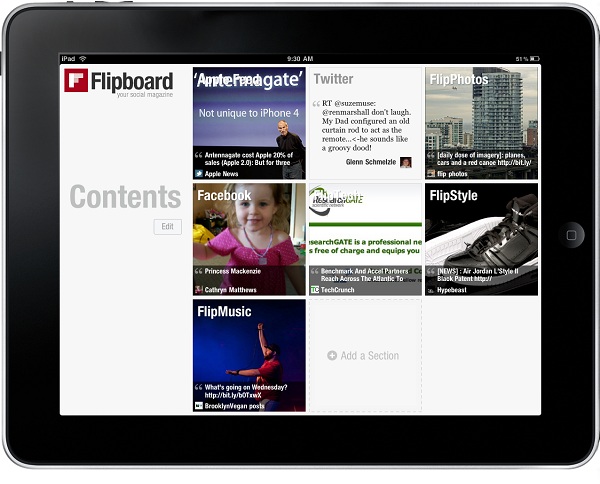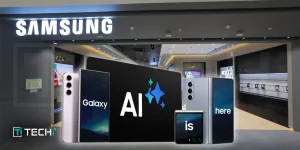Flipboard is, on the surface, a pretty, user-friendly iPad app that creates a personalized magazine for you.
But it’s also a sign of what could be a coming catastrophe for web media.
Flipboard works by pulling in RSS feeds and links from Facebook and Twitter to produce a content delivery vehicle tailored just for you. But the core of that idea is that the app creates a reading experience suited to the tablet and, soon, the smartphone.
This is a big deal because prior to this, content has always been delivered in a form that was only partly about the content itself. It was largely about delivering ads. Look at the way any web page is structured, and you’ll see that it’s built to make money. And fair enough; this has been the business model for decades: Build a form in which readers expect ads with their content, and companies can introduce and promote their goods and services while readers inform themselves.

But Flipboard is like Napster for written content.
See, Napster gave people access to thousands of songs for essentially no cost. But it also changed how people related to music. They saw how much better it was to get music digitally, and that getting lots of it quickly and frequently was good. Going back to ripping CDs or buying DRM-laden tracks seemed backward and silly, even if legally speaking it was the right thing to do.
Flipboard does something similar. Once you experience what it’s like to simply read content that is aesthetically pleasing, tailored to you, and isn’t about one magazine or newspaper, but hundreds of them, it’s a bit hard to go back.
This is a problem for media companies. It’s a Napster-sized problem. Because by prioritizing the reading experience – and doing it for free so far – Flipboard have shown that the web’s capacity to filter information
and focus on the actual experience of reading something is a real problem for the ad-suported model.
Flipboard shows a fundamental disconnect between the nature of tablet news apps and the business models of old media companies. Tablet apps emphasize the experience of consuming content in a manner that isn’t interrupted or sullied by ads, which means that any revenue generated by such apps will have to be done in a way that continues that emphasis on reading experience. And what is that? Nobody knows.
Even if you charge for the app, the amount of revenue pales in comparison to ads. For example, a new project from bit.ly called
news.me does something similar to Flipboard, but charges for it. How much? 99 cents a week. So even though it has content from Gawker, the NYT etc., it’s a tiny amount of money. They would have to hope for millions of subscribers for a niche delivery system.
So the easy thing to say now would be that one business will kill another. Apps like Flipboard will crush big media or big media will shut down apps like Flipboard. But a much scarier proposition is that neither will happen because there’s no common ground between the two, because there’s no way to produce as much revenue from aggregation as there is ad-supported news and content.
So perhaps the tablet magazine-like aggregator – even if it is from big media co’s themselves – will cause something similar to what happened to the music business: where the web takes away a large part of an old media business but cannot replace or make up for it with digital.
Of course, ‘Big Media’ is trying things on their own, like AOL’s Editions project. But will they also pull in content from non-AOL properties? See, the whole concept of magazines or newspapers as singular entities clashes with the idea of aggregating sources in a way that is built for the ‘promiscuous’ reader.
So, while many said that Flipboard and similar apps could save the industry, they could instead just shrink it.
 But Flipboard is like Napster for written content.
See, Napster gave people access to thousands of songs for essentially no cost. But it also changed how people related to music. They saw how much better it was to get music digitally, and that getting lots of it quickly and frequently was good. Going back to ripping CDs or buying DRM-laden tracks seemed backward and silly, even if legally speaking it was the right thing to do.
Flipboard does something similar. Once you experience what it’s like to simply read content that is aesthetically pleasing, tailored to you, and isn’t about one magazine or newspaper, but hundreds of them, it’s a bit hard to go back.
This is a problem for media companies. It’s a Napster-sized problem. Because by prioritizing the reading experience – and doing it for free so far – Flipboard have shown that the web’s capacity to filter information and focus on the actual experience of reading something is a real problem for the ad-suported model.
Flipboard shows a fundamental disconnect between the nature of tablet news apps and the business models of old media companies. Tablet apps emphasize the experience of consuming content in a manner that isn’t interrupted or sullied by ads, which means that any revenue generated by such apps will have to be done in a way that continues that emphasis on reading experience. And what is that? Nobody knows.
Even if you charge for the app, the amount of revenue pales in comparison to ads. For example, a new project from bit.ly called news.me does something similar to Flipboard, but charges for it. How much? 99 cents a week. So even though it has content from Gawker, the NYT etc., it’s a tiny amount of money. They would have to hope for millions of subscribers for a niche delivery system.
So the easy thing to say now would be that one business will kill another. Apps like Flipboard will crush big media or big media will shut down apps like Flipboard. But a much scarier proposition is that neither will happen because there’s no common ground between the two, because there’s no way to produce as much revenue from aggregation as there is ad-supported news and content.
So perhaps the tablet magazine-like aggregator – even if it is from big media co’s themselves – will cause something similar to what happened to the music business: where the web takes away a large part of an old media business but cannot replace or make up for it with digital.
Of course, ‘Big Media’ is trying things on their own, like AOL’s Editions project. But will they also pull in content from non-AOL properties? See, the whole concept of magazines or newspapers as singular entities clashes with the idea of aggregating sources in a way that is built for the ‘promiscuous’ reader.
So, while many said that Flipboard and similar apps could save the industry, they could instead just shrink it.
But Flipboard is like Napster for written content.
See, Napster gave people access to thousands of songs for essentially no cost. But it also changed how people related to music. They saw how much better it was to get music digitally, and that getting lots of it quickly and frequently was good. Going back to ripping CDs or buying DRM-laden tracks seemed backward and silly, even if legally speaking it was the right thing to do.
Flipboard does something similar. Once you experience what it’s like to simply read content that is aesthetically pleasing, tailored to you, and isn’t about one magazine or newspaper, but hundreds of them, it’s a bit hard to go back.
This is a problem for media companies. It’s a Napster-sized problem. Because by prioritizing the reading experience – and doing it for free so far – Flipboard have shown that the web’s capacity to filter information and focus on the actual experience of reading something is a real problem for the ad-suported model.
Flipboard shows a fundamental disconnect between the nature of tablet news apps and the business models of old media companies. Tablet apps emphasize the experience of consuming content in a manner that isn’t interrupted or sullied by ads, which means that any revenue generated by such apps will have to be done in a way that continues that emphasis on reading experience. And what is that? Nobody knows.
Even if you charge for the app, the amount of revenue pales in comparison to ads. For example, a new project from bit.ly called news.me does something similar to Flipboard, but charges for it. How much? 99 cents a week. So even though it has content from Gawker, the NYT etc., it’s a tiny amount of money. They would have to hope for millions of subscribers for a niche delivery system.
So the easy thing to say now would be that one business will kill another. Apps like Flipboard will crush big media or big media will shut down apps like Flipboard. But a much scarier proposition is that neither will happen because there’s no common ground between the two, because there’s no way to produce as much revenue from aggregation as there is ad-supported news and content.
So perhaps the tablet magazine-like aggregator – even if it is from big media co’s themselves – will cause something similar to what happened to the music business: where the web takes away a large part of an old media business but cannot replace or make up for it with digital.
Of course, ‘Big Media’ is trying things on their own, like AOL’s Editions project. But will they also pull in content from non-AOL properties? See, the whole concept of magazines or newspapers as singular entities clashes with the idea of aggregating sources in a way that is built for the ‘promiscuous’ reader.
So, while many said that Flipboard and similar apps could save the industry, they could instead just shrink it.
 But Flipboard is like Napster for written content.
See, Napster gave people access to thousands of songs for essentially no cost. But it also changed how people related to music. They saw how much better it was to get music digitally, and that getting lots of it quickly and frequently was good. Going back to ripping CDs or buying DRM-laden tracks seemed backward and silly, even if legally speaking it was the right thing to do.
Flipboard does something similar. Once you experience what it’s like to simply read content that is aesthetically pleasing, tailored to you, and isn’t about one magazine or newspaper, but hundreds of them, it’s a bit hard to go back.
This is a problem for media companies. It’s a Napster-sized problem. Because by prioritizing the reading experience – and doing it for free so far – Flipboard have shown that the web’s capacity to filter information and focus on the actual experience of reading something is a real problem for the ad-suported model.
Flipboard shows a fundamental disconnect between the nature of tablet news apps and the business models of old media companies. Tablet apps emphasize the experience of consuming content in a manner that isn’t interrupted or sullied by ads, which means that any revenue generated by such apps will have to be done in a way that continues that emphasis on reading experience. And what is that? Nobody knows.
Even if you charge for the app, the amount of revenue pales in comparison to ads. For example, a new project from bit.ly called news.me does something similar to Flipboard, but charges for it. How much? 99 cents a week. So even though it has content from Gawker, the NYT etc., it’s a tiny amount of money. They would have to hope for millions of subscribers for a niche delivery system.
So the easy thing to say now would be that one business will kill another. Apps like Flipboard will crush big media or big media will shut down apps like Flipboard. But a much scarier proposition is that neither will happen because there’s no common ground between the two, because there’s no way to produce as much revenue from aggregation as there is ad-supported news and content.
So perhaps the tablet magazine-like aggregator – even if it is from big media co’s themselves – will cause something similar to what happened to the music business: where the web takes away a large part of an old media business but cannot replace or make up for it with digital.
Of course, ‘Big Media’ is trying things on their own, like AOL’s Editions project. But will they also pull in content from non-AOL properties? See, the whole concept of magazines or newspapers as singular entities clashes with the idea of aggregating sources in a way that is built for the ‘promiscuous’ reader.
So, while many said that Flipboard and similar apps could save the industry, they could instead just shrink it.
But Flipboard is like Napster for written content.
See, Napster gave people access to thousands of songs for essentially no cost. But it also changed how people related to music. They saw how much better it was to get music digitally, and that getting lots of it quickly and frequently was good. Going back to ripping CDs or buying DRM-laden tracks seemed backward and silly, even if legally speaking it was the right thing to do.
Flipboard does something similar. Once you experience what it’s like to simply read content that is aesthetically pleasing, tailored to you, and isn’t about one magazine or newspaper, but hundreds of them, it’s a bit hard to go back.
This is a problem for media companies. It’s a Napster-sized problem. Because by prioritizing the reading experience – and doing it for free so far – Flipboard have shown that the web’s capacity to filter information and focus on the actual experience of reading something is a real problem for the ad-suported model.
Flipboard shows a fundamental disconnect between the nature of tablet news apps and the business models of old media companies. Tablet apps emphasize the experience of consuming content in a manner that isn’t interrupted or sullied by ads, which means that any revenue generated by such apps will have to be done in a way that continues that emphasis on reading experience. And what is that? Nobody knows.
Even if you charge for the app, the amount of revenue pales in comparison to ads. For example, a new project from bit.ly called news.me does something similar to Flipboard, but charges for it. How much? 99 cents a week. So even though it has content from Gawker, the NYT etc., it’s a tiny amount of money. They would have to hope for millions of subscribers for a niche delivery system.
So the easy thing to say now would be that one business will kill another. Apps like Flipboard will crush big media or big media will shut down apps like Flipboard. But a much scarier proposition is that neither will happen because there’s no common ground between the two, because there’s no way to produce as much revenue from aggregation as there is ad-supported news and content.
So perhaps the tablet magazine-like aggregator – even if it is from big media co’s themselves – will cause something similar to what happened to the music business: where the web takes away a large part of an old media business but cannot replace or make up for it with digital.
Of course, ‘Big Media’ is trying things on their own, like AOL’s Editions project. But will they also pull in content from non-AOL properties? See, the whole concept of magazines or newspapers as singular entities clashes with the idea of aggregating sources in a way that is built for the ‘promiscuous’ reader.
So, while many said that Flipboard and similar apps could save the industry, they could instead just shrink it.


